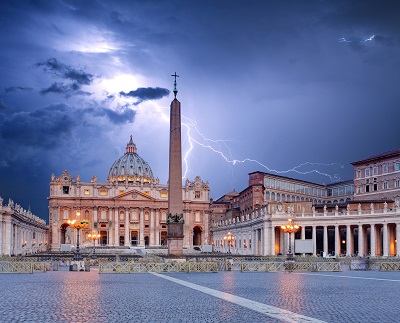"Che" Guevara in the Vatican
By Anthony de Jasay

Pope Francis is the outstanding spiritual leader of today’s class war.
The Christian faith holds that men and women have a life after death, and continue as individuals in an eternal life with the Grace of God. Their earthly life is just a preparation and is only relevant because of what comes afterward. The Church (and in more recent history, the several Christian Churches) have the care of teaching the faith and assisting the believers in living their life according to their faith. The essence of Christianity has been unchanged for the last two thousand years, but the role of the Church has undergone major changes. As I write, it looks like it is preparing itself for a major change once again. It is as if it were preparing itself for a renewal of the class war.
Early Christianity was a religion of the “underclass”, a religion of the poor. It existed and spread in opposition against the Roman Empire, which had a contrary state religion of its own and a social structure with the rich holding both the wealth and the political power. Christianity responded by declaring wealth as actually sinful. The hostility between the Christian religion and Roman political power gradually ended with the victory of the former, with the Roman Church securely establishing itself by the fourth and fifth centuries. It ceased to be a religion of the poor but penetrated all classes. It recognised its basic vocation as leading the believers along their way in Grace, with little, if any, intervention in their earthly preoccupations. However, it finally gave some sign that these earthly lives were part of its concern in the famous Encyclical Rerum Novarum1 (1891), but its main interest still remained the celestial afterlife of the faithful.
“The great turning point came in 2013 with the election of Pope Francis, who seemed determined to follow in the footsteps of his Argentinian countryman, the major revolutionary ‘Che’ Guevara.”
The great turning point came in 2013 with the election of Pope Francis, who seemed determined to follow in the footsteps of his Argentinian countryman, the major revolutionary “Che” Guevara. There was a full generation between the two, and of course also a change in destiny. Che Guevara was executed in 1967 in Bolivia after being a minister in revolutionary Cuba and a leader of revolutionary movements throughout most of Latin America. If he had a doctrine other than the destruction of the existing order, it was a sort of popular Marxism. Ten years after the execution of Che Guevara, Francis was named archbishop of Buenos Aires. He was not a Marxist in any apparent sense, and had taken his revolutionary doctrine from Christian morality. What Che Guevara would destroy, Francis would severely criticise and call for “… change, real change, structural change… “2 without really telling us what the change was supposed to consist of. It was just change that Christian morality would be ready to accept. Politically, rather than morally, Francis was the pupil of Juan Peron, whose disastrous economic policy impoverished Argentina by inflicting on it protectionism, forced industrialisation and “social” welfare.
There is great difficulty in understanding Pope Francis’s reforming call, because in at least one instance it came with a surprising approval for the existing system. Francis was reported saying in front of the U.S. Congress in September 2015, “It goes without saying that part of this great effort is the creation and distribution of wealth. The right use of natural resources, the proper application of technology and the harnessing of the spirit of enterprise are essential elements of an economy which seeks to be modern, inclusive and sustainable.” Yet at almost the same time, in his Evangelii Gaudium he condemns the market system and the claim that the free market produces progress and prosperity even for the poor because “Some people continue to defend trickle-down theories which assume that economic growth, encouraged by a free market, will inevitably succeed in bringing about greater justice and inclusiveness in the world. This opinion, which has never been confirmed (emphasis added) by the facts, expresses a crude and naïve trust in the goodness of those wielding economic power and in the sacralised workings of the prevailing economic system.”3 We are forced to remember that this naïve theory happens to have been confirmed over and over again in economic history in the long run.
Laudato Si
In his great Encyclical on the environment, the Pope argues that our problem is not global warming or other symptoms of the planet failing to support the punishment that human habitation inflicts upon it, but rather the fact that all environmental degradation is suffered not by humanity as an all, but by its poorest part.
… we cannot adequately combat environmental degradation unless we attend to causes related to human and social degradation… Both everyday experience and scientific research show that the gravest effects of all attacks on the environment are suffered by the poorest.4
Air conditioning in hot climates is available to the well-to-do, but the energy consumed is ultimately a cost borne mainly by the poor. Overfishing is just a minor inconvenience in the diet of the well-to-do but can be a disaster for poor fishermen. The well-to-do can move away from an increase in the sea level, but poor people on vulnerable seashores may have nowhere to go. Population growth should not be blamed on the poor but on the scarcity of resources which in fact is the result of consumerism by a (wealthy) minority.
In the meantime, economic powers continue to justify the current global system where priority tends to be given to speculation and pursuit of financial gain.5
For more on these topics, see “Distributive Justice, Wet Rain,” by Anthony de Jasay, Library of Economics and Liberty, August 4, 2014; and “The Nature and Significance of Marx’s: Capital: A Critique of Political Economy,” by David L. Prychitko, Library of Economics and Liberty, September 6, 2004.
In fact, much of this Encyclical can be understood and simplified as an appeal for distributive justice, which takes resources from the rich for giving them to the poor, rather than a system of economising the renewable resources of the world. It is more like a revolutionary program than a plan of economic reasoning.
For the last thousand five hundred years or more, the Roman Catholic Church has been a centralising organisation serving no class and no country; its universal aim was to teach its religion throughout the centuries, and to help its believers in reaching their own universal aim, eternal Grace in God. Its earthly tools were increasing wealth, ceremonial pomp and dignity, as well as influence and international diplomacy and occasionally even warfare. Historians have called its behaviour as typical of a powerful organisation serving its own aims like any sovereign state throughout its history. Sympathetic observers are perfectly able to see the Church and its actions as ultimately serving the salvation of its believer. However, as we observe today, we see the Church and especially its worldly head, the Pope, as also serving the tangible interest of the underclass in a way which can well remind us of the first few centuries of the faith. For where this will lead, we can only watch and wait.
Pope Francis speech at World Meeting of Popular Movements in Santa Cruz, Bolivia, 9 July 2015.
Pope Francis’s Apostolic Exhortation Evangelii Gaudium, 54. No to an economy of exclusion. Available online at: http://w2.vatican.va/content/francesco/en/apost_exhortations/documents/papa-francesco_esortazione-ap_20131124_evangelii-gaudium.html.
Pope Francis’ Encyclical Laudato Si, V. Global Inequality 48. Available online at: http://w2.vatican.va/content/francesco/en/encyclicals/documents/papa-francesco_20150524_enciclica-laudato-si.html.
Pope Francis’ Encyclical Laudato Si, VI. Weak Responses 56.
*Anthony de Jasay is an Anglo-Hungarian economist living in France. He is the author, a.o., of The State as well as other books, including Social Contract, Free Ride, Political Philosophy, Clearly, Political Economy, Concisely, Economic Sense and Nonsense, Helmut Kliemt, ed., and Justice and Its Surroundings. His books may be purchased through the Liberty Fund Book Catalog.
The State is also available online on this website.
For more articles by Anthony de Jasay, see the Archive.

